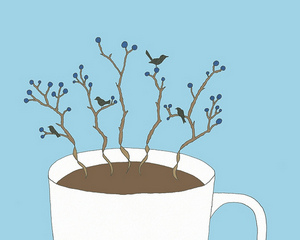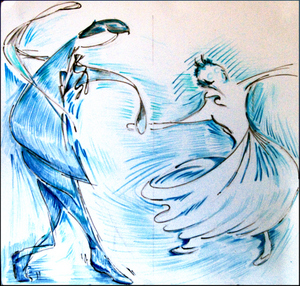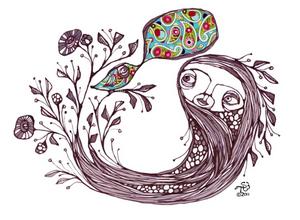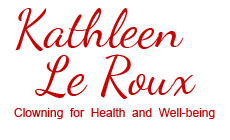Stories & Anecdotes
Bath of Sound
 “Sophia” was nearing the end of her journey with Dementia. She had become largely non-verbal, was highly confused, bed-bound and was often in a tense, agitated state, her brow knitted, hands clenched. The clowns entered her room quietly and after noting her state of body tension and her tightly closed eyes, began to hum softly. Using soft ukulele music, gentle rhythm and improvised vocals, the clowns created an atmosphere of calm and warmth – beautiful melodies, and a soundscape of crickets and birds, humming, breath – a soothing bath of sound. The simplicity of presence. The clowns drew their improvised inspiration from the personal items they noticed in her room – a crucifix above her bed, bird figurines on her dresser, a nature painting on her wall. As the sound bath developed, Sophia began to relax, and there was a shift in her attention, a deeper listening. The clowns moved closer to her bedside and continued their vocal caresses. Sophia accepted Dizzy’s soft hand in hers and as Dizzy caressed her forehead Sophia pressed into this warming touch. “Ohhhh, yes” they heard her say quietly. Encouraged by her positive reaction, the clowns continued with a slow, harmonious version of Amazing Grace. When the last notes dissipated, Sophia sighed and in an unexpectedly clear voice said “Thank you God.” After the 25 minute soundscape, Sophia’s agitated movements had quieted, her brow had smoothed, loosened and transformed to a more peaceful expression. She was visibly calmer.
“Sophia” was nearing the end of her journey with Dementia. She had become largely non-verbal, was highly confused, bed-bound and was often in a tense, agitated state, her brow knitted, hands clenched. The clowns entered her room quietly and after noting her state of body tension and her tightly closed eyes, began to hum softly. Using soft ukulele music, gentle rhythm and improvised vocals, the clowns created an atmosphere of calm and warmth – beautiful melodies, and a soundscape of crickets and birds, humming, breath – a soothing bath of sound. The simplicity of presence. The clowns drew their improvised inspiration from the personal items they noticed in her room – a crucifix above her bed, bird figurines on her dresser, a nature painting on her wall. As the sound bath developed, Sophia began to relax, and there was a shift in her attention, a deeper listening. The clowns moved closer to her bedside and continued their vocal caresses. Sophia accepted Dizzy’s soft hand in hers and as Dizzy caressed her forehead Sophia pressed into this warming touch. “Ohhhh, yes” they heard her say quietly. Encouraged by her positive reaction, the clowns continued with a slow, harmonious version of Amazing Grace. When the last notes dissipated, Sophia sighed and in an unexpectedly clear voice said “Thank you God.” After the 25 minute soundscape, Sophia’s agitated movements had quieted, her brow had smoothed, loosened and transformed to a more peaceful expression. She was visibly calmer.
Those who are further along in their Dementia are often the most isolated and receive the least amount of personalized, focused attention. We take the time necessary to make a connection, listening deeply to what is needed in the moment, drawing inspiration from what we know, learn and sense about the person.
Mischief Man
 Dizzy is trying to sanitize her hands at a particularly stubborn spout mounted on the wall. Missy has had no trouble and watches curiously as Dizzy pushes and prods the dispenser, contorting herself trying to get it to work. “Henry” wheels himself towards them, interested and amused. He exchanges pleasantries with Missy as Dizzy continues huffling and struggling. “You know, there’s ALCOHOL in there!” Henry mischievously proclaims. Dizzy stops, turns to look at him and at Missy with a widened expression. “ALCOHOL?” she repeats in amazement and increased interest. “You keep alcohol on the walls?” She slowly lowers her head to be eye level with the spout and begins to open her mouth. Henry bursts out laughing as Missy, horrified, leaps in front of Dizzy blocking her attempt. Dizzy is diverted momentarily but then spots another dispenser on the opposite wall. Henry laughs as Dizzy and Missy continue their game, Dizzy trying to get to the dispensers and Missy finding more and more creative ways to divert her attention. Henry is delighted by the chaos and mischief he has caused!
Dizzy is trying to sanitize her hands at a particularly stubborn spout mounted on the wall. Missy has had no trouble and watches curiously as Dizzy pushes and prods the dispenser, contorting herself trying to get it to work. “Henry” wheels himself towards them, interested and amused. He exchanges pleasantries with Missy as Dizzy continues huffling and struggling. “You know, there’s ALCOHOL in there!” Henry mischievously proclaims. Dizzy stops, turns to look at him and at Missy with a widened expression. “ALCOHOL?” she repeats in amazement and increased interest. “You keep alcohol on the walls?” She slowly lowers her head to be eye level with the spout and begins to open her mouth. Henry bursts out laughing as Missy, horrified, leaps in front of Dizzy blocking her attempt. Dizzy is diverted momentarily but then spots another dispenser on the opposite wall. Henry laughs as Dizzy and Missy continue their game, Dizzy trying to get to the dispensers and Missy finding more and more creative ways to divert her attention. Henry is delighted by the chaos and mischief he has caused!
Responding to both verbal and non-verbal cues from the client, we are skilled at determining what style of play and what subjects will delight and energize each person.
Coffee Dreams
 “Mr Smith’s” Alzheimer’s is advancing. Although he is still active, he is often confused and spends most of his day on a constant search for coffee, repeatedly asking staff for more. Missy and Dizzy find Mr Smith at the nursing station requesting his cup and looking agitated at the lack of interest from the staff. “Mr Smith!” The clowns exclaim, with arms outstretched. Mr Smith refocuses a moment and then a smile creeps across his face. They embrace warmly and Mr Smith complains about his empty cup to the clowns. “Let’s go look for coffee!” The clowns exclaim extending an inviting arm. He accompanies them down the hallway and when they get to his room, Dizzy remarks – “Mr Smith, I wish there was a HUGE GARGANTUAN coffee machine in your own room!” Mr Smith laughs. “It could go right over there” – she says with big gestures outlining the contours of an oversized coffee machine. “Then you could have coffee straight from the source all day long!” – offers Missy, leaning to the “spout” of the imaginary machine and “guzzling” an imaginary stream. Mr Smith laughs again. “Yes, THAT would be nice!” he agrees. Dizzy’s eyes widen as she surveys the room. “Wow, look at your wall!” Dizzy points to the various photos on Mr Smith’s wall and soon he is chatting about his family. He sits in a chair, invites the clowns to sit on his bed. He is relaxed now, and looks calmly out the window, smiling. They return briefly to the subject of coffee, though now it is not so charged. As Mr Smith peers into his empty mug Dizzy begins to strum sadly on her uke “You can’t always git what you wa-ant” and Mr Smith watches, amused, tapping the rhythm. Dizzy and Missy sing, with increasing passion and verve, the familiar Rolling Stones song to a now contented, smiling man.
“Mr Smith’s” Alzheimer’s is advancing. Although he is still active, he is often confused and spends most of his day on a constant search for coffee, repeatedly asking staff for more. Missy and Dizzy find Mr Smith at the nursing station requesting his cup and looking agitated at the lack of interest from the staff. “Mr Smith!” The clowns exclaim, with arms outstretched. Mr Smith refocuses a moment and then a smile creeps across his face. They embrace warmly and Mr Smith complains about his empty cup to the clowns. “Let’s go look for coffee!” The clowns exclaim extending an inviting arm. He accompanies them down the hallway and when they get to his room, Dizzy remarks – “Mr Smith, I wish there was a HUGE GARGANTUAN coffee machine in your own room!” Mr Smith laughs. “It could go right over there” – she says with big gestures outlining the contours of an oversized coffee machine. “Then you could have coffee straight from the source all day long!” – offers Missy, leaning to the “spout” of the imaginary machine and “guzzling” an imaginary stream. Mr Smith laughs again. “Yes, THAT would be nice!” he agrees. Dizzy’s eyes widen as she surveys the room. “Wow, look at your wall!” Dizzy points to the various photos on Mr Smith’s wall and soon he is chatting about his family. He sits in a chair, invites the clowns to sit on his bed. He is relaxed now, and looks calmly out the window, smiling. They return briefly to the subject of coffee, though now it is not so charged. As Mr Smith peers into his empty mug Dizzy begins to strum sadly on her uke “You can’t always git what you wa-ant” and Mr Smith watches, amused, tapping the rhythm. Dizzy and Missy sing, with increasing passion and verve, the familiar Rolling Stones song to a now contented, smiling man.
We are skilled at listening to and honoring the underlying emotion of behaviours. Affirming and honoring a person in authentic, playful ways, allows us to accompany them as equals, as friends. This often alleviates stress, and opens up new avenues of communication and interaction.
What a Party!
 Dizzy is singing a lively song on her uke to three nearby gentleman seated at a table in the day centre lunch area. “Ralph” begins tapping out the rhythm on his chair. Soon after “Fred” begins to drum the rhythm on his lap. Ralph becomes more and more elaborate with his rhythms, adding sophisticated syncopation to the surprise and delight of all. Dizzy is mightily impressed and calls out “Drum solo!” to let Ralph take it away! He taps and drums on the chair, the table, his lap, creating a fabulous array of expert percussion sounds – a real soloist! Fred continues to provide the support beat on his lap, a wide, blissful expression settling across his face. As his drum buddy offers a wild percussive flourish, Dizzy picks up the melody again and now “Pete,” who has been listening with eagerness, rises from his chair to dance. Peachy enthusiastically arrives into his arms and the two bop across the floor to the rising energy. As staff walk by they too pick up the rhythm, bouncing, laughing and dancing down the hallway. The drummers, the music, the dancers – What a party!
Dizzy is singing a lively song on her uke to three nearby gentleman seated at a table in the day centre lunch area. “Ralph” begins tapping out the rhythm on his chair. Soon after “Fred” begins to drum the rhythm on his lap. Ralph becomes more and more elaborate with his rhythms, adding sophisticated syncopation to the surprise and delight of all. Dizzy is mightily impressed and calls out “Drum solo!” to let Ralph take it away! He taps and drums on the chair, the table, his lap, creating a fabulous array of expert percussion sounds – a real soloist! Fred continues to provide the support beat on his lap, a wide, blissful expression settling across his face. As his drum buddy offers a wild percussive flourish, Dizzy picks up the melody again and now “Pete,” who has been listening with eagerness, rises from his chair to dance. Peachy enthusiastically arrives into his arms and the two bop across the floor to the rising energy. As staff walk by they too pick up the rhythm, bouncing, laughing and dancing down the hallway. The drummers, the music, the dancers – What a party!
We are agents of community – working to connect people to each other in the spirit of play. Our presence offers opportunities for shared experience and socialization, and for joyful interactions outside the norm.
A conversation in Melody
 “Betty” is an extremely frail, bed-bound resident who doesn’t attend regular programming activities. Dizzy and Peachy approached Betty’s bed quietly, not sure whether she was sleeping. They began singing a soft, improvised melody and saw Betty stir in response. As they paused to observe her response, Betty opened her mouth and began to sing softly “La la la la la la la.” She then paused and waited. Dizzy and Peachy looked at each other, and then, picking up on Betty’s tune, responded with an improvised phrase “La la laaa la laa la.” Betty listened and with eyes still closed, responded with a new musical phrase, with operatic beauty and precisely in tune. The three continued to sing to each other, back and forth, sharing their phrasing, inspired by each other’s melodic offerings, sometimes singing all at once in unison, and sometimes singing solo – an angelic “conversation” of musical improvisation, without words, without discussion – simply following the beauty and impulses of the moment.
“Betty” is an extremely frail, bed-bound resident who doesn’t attend regular programming activities. Dizzy and Peachy approached Betty’s bed quietly, not sure whether she was sleeping. They began singing a soft, improvised melody and saw Betty stir in response. As they paused to observe her response, Betty opened her mouth and began to sing softly “La la la la la la la.” She then paused and waited. Dizzy and Peachy looked at each other, and then, picking up on Betty’s tune, responded with an improvised phrase “La la laaa la laa la.” Betty listened and with eyes still closed, responded with a new musical phrase, with operatic beauty and precisely in tune. The three continued to sing to each other, back and forth, sharing their phrasing, inspired by each other’s melodic offerings, sometimes singing all at once in unison, and sometimes singing solo – an angelic “conversation” of musical improvisation, without words, without discussion – simply following the beauty and impulses of the moment.
We approach each person with a sense of love and play, always listening to both verbal and non-verbal cues to direct us. We listen to and live in each unfolding moment, allowing the play to emerge organically, following the lead of the individual.
